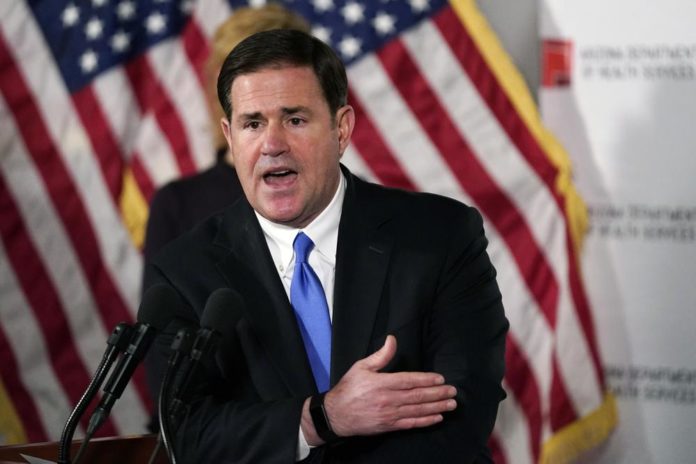
Officials in the city of Tucson plan to ignore Arizona’s new “Second Amendment sanctuary” law that bars state and local governments from enforcing certain federal gun regulations, possibly setting up a court fight as a growing number of cities and counties in the United States declare themselves similar firearm havens.
The move by Democratic Mayor Regina Romero and the City Council again puts Tucson and Republican-led state at odds over how to regulate gun sales and use.
The southern Arizona city has long tried to enforce gun laws stricter than the state’s, including mandating background checks for guns purchased on city property and destroying seized firearms. Over the years, those measures have been challenged after the Republican-controlled Legislature enacted laws barring the actions.
The new action came after GOP Gov. Doug Ducey signed a bill in April declaring that Arizona is a so-called Second Amendment sanctuary. It was partly a response to the election of President Joe Biden, who has vowed to enact tighter firearms regulations.
A growing movement of at least 1,200 local governments have declared themselves sanctuaries insulated from state and federal gun laws since 2018, when high-profile mass shootings prompted calls for stronger regulations. Many are symbolic but some carry legal force.
In addition to Arizona, a handful of other legislatures, including in Kentucky, Tennessee and Wisconsin, jumped on the idea this year when Biden took office. During his campaign, Biden pledged to enact universal background checks and an assault weapons ban, among other measures.
The Arizona Daily Star reports that the state and city could be headed for a legal battle over Tucson’s June 22 resolution to continue enforcing all federal gun laws.
The resolution unanimously passed by the council proclaims that “federal laws, orders and acts that regulate firearms in a manner that is consistent with the requirements of the United States Constitution” will “remain in full force and effect” within city limits “regardless of whether those laws, orders or acts are more restrictive or prohibitive than regulations established under the laws of this state.”
Councilman Steve Kozachik introduced the resolution last month and said he believes the new state law is unconstitutional.
“Let them challenge us,” he told the newspaper.
Kozachik said his aim is to have the law “declared unconstitutional and thrown out plain and simple, so we continue to have free rein to enforce federal gun laws locally.”
Arizona’s law says the state is not beholden to upholding U.S. gun laws and prohibits “any personnel or financial resources to enforce, administer or cooperate with any act, law, treaty, order, rule or regulation of the U.S. government that is inconsistent with any Arizona law regarding the regulation of firearms.”
Federal statistics show Arizona has the 15th-highest gun-related mortality rate.
Ducey spokesman C.J. Karamargin said Tuesday that the governor’s office expects all Arizona cities to follow the law.
“The Second Amendment is clear on our right to keep and bear arms,” Karamargin said in an email. “This law protects Arizonans’ Constitutional rights from federal overreach.”
When Ducey signed the law, he described it as an effort to protect “an enumerated right” and that it “was a proactive law for what is possible to come out of the Biden administration.”
Charles Heller, communications coordinator for the gun rights group the Arizona Citizens Defense League, said he doesn’t think Tucson’s resolution will do anything to change state law.
“They’re attempting to wave a flag, no matter how weak, that says they don’t like it,” Heller said.
In his view, passing the law was a step in the right direction for Arizona, which has relatively relaxed gun laws, because “the federal government shouldn’t be enforcing unconstitutional laws, and we’re not going to help them.”
Meanwhile, the Tucson resolution notes that the “United States Supreme Court has explicitly rejected the idea that the states can nullify federal law.”
Republished with the permission of the Associated Press.













